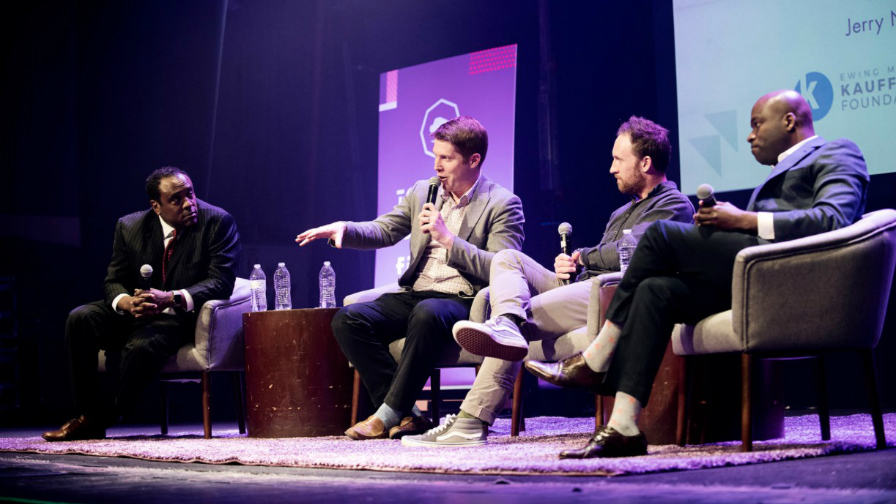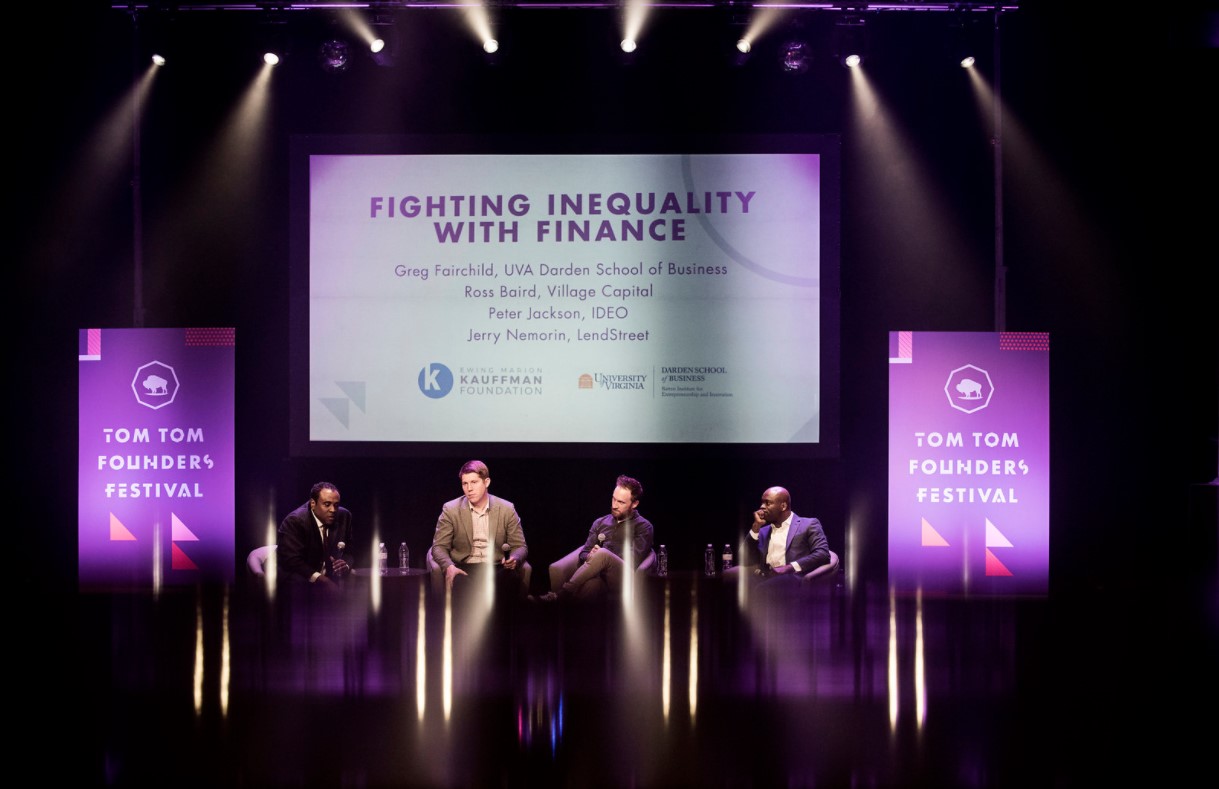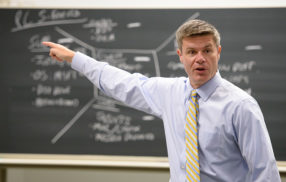
UVA Darden Experts Share Innovative Finance Tools to Combat Inequality
By Carlos Santos
A movement is afoot to support entrepreneurs battling the headwinds of socioeconomic inequalities.
University of Virginia Darden School of Business Professor Greg Fairchild led a dialogue among a team of experts to scrutinize how the movement is fighting inequality with finance at a Tom Tom Founders Festival panel in Charlottesville, Virginia.
The panel of innovative financial thinkers included:
- Jerry Nemorin (MBA ’08), founder and CEO of LendStreet, whose mission is to help people get out of debt, revive their credit and attain financial health.
- Ross Baird, a 2007 UVA graduate, lecturer at the UVA Batten School of Leadership and Public Policy, and president of Village Capital, a firm that backs entrepreneurs in locations and industries where most investors aren’t looking.
- Peter Jackson, portfolio director at IDEO San Francisco, who is analyzing the junction of consumer experience and organizational design.
Fairchild, who serves as Darden’s academic director of Public Policy and Entrepreneurship, an initiative of the Batten Institute for Entrepreneurship and Innovation, moderated a discussion about the complex issues of inequality — debt, bias, poor financial products and educational disparities — that prevent millions of Americans from starting and owning businesses.
The inequality is sometimes hard to grasp. Baird said he attended a seminar at the University of Virginia in which the idea of privilege hit home when everyone in the classroom stood and was asked by the professor to take one step forward if you had more than 100 books in your house. “There are unintentional things you have going for you that you’re not aware of,” Baird said.
Fairchild recalled taking a high school date to a Ponderosa Steakhouse where her continued silence unnerved him. She finally admitted she had never been to a restaurant. “I went to high school with her, had classes with her, thought she was cool. I realized that eating at a restaurant was something I took for granted,” Fairchild said.
Baird noted that the rise of inequality — which has left entrepreneurship levels at a 100-year low — is driven in large part by quasi-monopolistic companies and the growing concentration of wealth and power. “People in power set up rules that are good for people in power,” he said. Those people also form tight circles that can be difficult to access. “People who are close to people with money tend to have a lot of money.”
How do you help level the playing field? Nemorin, who grew up in Haiti, founded LendStreet to help consumers who are “over-leveraged, stressed or delinquent.” Most of his clients are, on average, $30,000 in debt. His business, for example, negotiates with banks to lower the debt to around $15,000 paid upfront. The clients usually don’t have the money and LendStreet advances the money at a reasonable interest rate while also helping their clients rebuild their credit.
Jackson touts consumer-friendly financial contracts. “Financial institutions want you to think how bankers think about finances — learn how to read your bank statements or mortgage papers — and once you figure that out, you’ll be a better consumer. I think that’s flat out wrong. Bankers should think like consumers.”
Jackson added that, “If you can’t explain to somebody in two pages how their mortgage will work, maybe you shouldn’t be selling the product. … We need to dispel the rumor that finance works in a perfectly efficient manner. Instead, let’s bring diversity of thought and people into finances who, because of their ability to develop empathy for people on the lower end of the spectrum, can come up with products and solutions that achieve great returns.”
Nemorin also put a focus on empathy and “acknowledging our own biases. We need to approach things with the lens of acknowledging what your potential biases might mean.”
Jackson called on the general public to use its political and spending power to fight inequality. “People in positions to write regulations” have the power to lessen inequality, he said. “We as individuals have the power to influence that through political participation and by where we spend $3 for a cup of coffee.”
Baird said those people who directly experience societal inequality “need ownership of the resources,” whether it’s through regulations or other means. “We need to give them agency to solve the problem.”
Fairchild believes much of inequality in the U.S. is driven by segregation of class, neighborhood location and education. “It’s striking to me that 70 years after the Brown [v. Board of Education of Topeka] decision, we still tend to live lives that are sorted economically, and thus racially.”
His effort against inequality is straightforward: Fairchild and his wife, Tierney Temple Fairchild (MBA ’93) are the founders of Resilience Education, an organization committed to providing high quality Socratic education to those that might not otherwise afford it.
The Darden School partnered with the Tom Tom Founders Festival for the seventh year in 2018, with the Batten Institute serving as a major sponsor of the festival.
The University of Virginia Darden School of Business prepares responsible global leaders through unparalleled transformational learning experiences. Darden’s graduate degree programs (MBA, MSBA and Ph.D.) and Executive Education & Lifelong Learning programs offered by the Darden School Foundation set the stage for a lifetime of career advancement and impact. Darden’s top-ranked faculty, renowned for teaching excellence, inspires and shapes modern business leadership worldwide through research, thought leadership and business publishing. Darden has Grounds in Charlottesville, Virginia, and the Washington, D.C., area and a global community that includes 18,000 alumni in 90 countries. Darden was established in 1955 at the University of Virginia, a top public university founded by Thomas Jefferson in 1819 in Charlottesville, Virginia.
Press Contact
Molly Mitchell
Associate Director of Content Marketing and Social Media
Darden School of Business
University of Virginia
MitchellM@darden.virginia.edu









